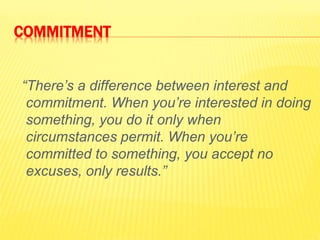Setting Goals and Commitment.pptx
- 1. SETTING GOALS AND COMMITMENT Project Management
- 2. COMMITMENT: WHY IS IT IMPORTANT? ’āÆ Commitment is important in any relationship. It is the value that galvanizes diverse entities so that all can work together unilaterally and seamlessly. ’āÆ Without it, there is no bond and no common purpose. ’āÆ commitment is the force that drives the relationship forward, toward a mutually desirable goal that usually points to growth and/or profitability.
- 3. COMMITMENT ŌĆ£ThereŌĆÖs a difference between interest and commitment. When youŌĆÖre interested in doing something, you do it only when circumstances permit. When youŌĆÖre committed to something, you accept no excuses, only results.ŌĆØ
- 4. COMMITMENT: WHY IS IT IMPORTANT? ’āÆ Invest resources such as time, energy, and money to ensure the desired outcome ’āÆ Pursue the goal consistently over time, even when under stress ’āÆ Reject ideas or action plans that promise short-term benefits but are inconsistent with the overall strategy for ultimate goal achievement ’āÆ Stand fast in the face of adversity, remaining determined and focused in the quest for the desired goal ’āÆ Apply creativity and resourcefulness in resolving problems or issues that would otherwise block the achievement of the goal
- 5. SETTING GOALS AND COMMITMENT ’āÆ Have you thought about what you want to be doing in five years' time? ’āÆ Do you know what you want to have achieved by the end of today? ’āÆ Are you clear about what is your main objective at work ? ’āÆ If you want to succeed, you need to set goals. Without goals you lack focus and direction.
- 6. MANAGER IS REQUIRED TO : Set a Vision (goal, objective, mission, purpose, shared vision)
- 7. Vision is the art of seeing things invisible Jonathan Swift
- 8. For one who has no objective, nothing is relevant - Confucius
- 9. ŌĆ£What are you doing?ŌĆØ ŌĆ£I am cutting woodŌĆØ ŌĆ£I am building that castleŌĆØ
- 10. A plan is How you get there A vision is Where you are going
- 11. ’āś Vision is ŌĆ£whereŌĆØ we want to be ’āś Mission or Purpose is ŌĆ£whyŌĆØ ’āś Goals and Objectives are ŌĆ£whatŌĆØ ’āś Action Plans are ŌĆ£howŌĆØ
- 12. TWO INFOSYS CO-FOUNDERS FLOAT NEW VENTURE ’āÆ Infosys' co-founders S. Gopalakrishnan and S.D. Shibulal have come together again to set up Axilor Ventures, a business incubator to help entrepreneurs and early-stage firms succeed in diverse verticals. ’āÆ "Axilor will focus on scalable, disruptive and technology-led business ideas from budding entrepreneurs and experienced professionals with entrepreneurial aspirations," the statement said.
- 13. TWO INFOSYS CO-FOUNDERS FLOAT NEW VENTURE ’āÆ For the selected start-ups, the duo founders will co-invest through individual funds ranging from Rs.30 lakh ($50,000) in the accelerator programme to Rs.6 crore ($1 million) in early-stage companies. ’āÆ These programmes, build a platform for innovation and entrepreneurship to benefit entrepreneurs and help them connect with innovation ecosystems outside India through partnerships."
- 14. SETTING GOALS AND COMMITMENT ’āÆ To accomplish goals, however, one need to know how to set them. ’āÆ Can't simply say, "I want" and expect it to happen. ’āÆ Goal setting is a process that starts with careful consideration of what individuals want to achieve, and ends with a lot of hard work to actually do it. ’āÆ In between there are very well defined steps that transcend the specifics of each goal. ’āÆ Knowing these steps will allow you to formulate goals that you can accomplish.
- 15. THE FIVE GOLDEN RULES Set Goals that Motivate You: ’āś When you set goals for yourself, it is important that they motivate you: this means making sure that they are important to you, and that there is value in achieving them. ’āś If you have little interest in the outcome, or they are irrelevant given the larger picture, then the chances of you putting in the work to make them happen are slim. Motivation is key to
- 16. THE FIVE GOLDEN RULES Set SMART Goals ’āś You have probably heard of "SMART goals" already. But do you always apply the rule? ’āś The simple fact is that for goals to be powerful, they should be designed to be SMART. There are many variations of what SMART stands for, but the essence is this ŌĆō goals should be:
- 17. THE FIVE GOLDEN RULES ’āÆ Specific. ’āÆ Measurable ’āÆ Attainable ’āÆ Relevant ’āÆ Time Bound.
- 18. THE FIVE GOLDEN RULES Set Goals in Writing ’āś The physical act of writing down a goal makes it real and tangible. ’āś As you write, use the word "will" instead of "would like to" or "might." For example, "I will reduce my operating expenses by 10 percent this year," not "I would like to reduce my operating expenses by 10 percent this year." ’āś The first goal statement has power and you can "see" yourself reducing expenses, the second lacks passion and gives you an excuse if you get sidetracked.
- 19. THE FIVE GOLDEN RULES Make an Action Plan: ’ā╝ This step is often missed in the process of goal setting. ’ā╝ You get so focused on the outcome that you forget to plan all of the steps that are needed along the way. ’ā╝ By writing out the individual steps, and then crossing each one off as you complete it, you'll realize that you are making progress towards your ultimate goal. This is especially important if your goal is big and demanding, or long-term.
- 20. THE FIVE GOLDEN RULES Stick With It ’āś Goal setting is an ongoing activity not just a means to an end. ’āś Build in reminders to keep yourself on track, and make regular time-slots available to review your goals. ’āś Make sure the relevance, value, and necessity remain high.



















